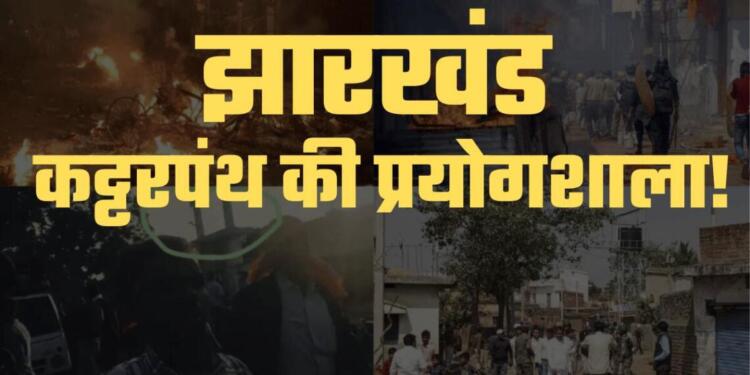In recent years, Jharkhand has witnessed a troubling pattern of Islamist violence against Hindu festivals and religious processions. The alarming frequency of such attacks raises concerns about growing religious intolerance and the inability of law enforcement to maintain peace. From Ram Navami to Holi, Shivratri, and Saraswati Puja, Hindu religious celebrations have repeatedly become targets of mob violence, stone-pelting, and arson. On March 25, 2025, a procession ahead of Ram Navami in Hazaribagh was attacked near Jama Masjid. What began as a minor argument over playing music quickly escalated into stone-pelting. The situation became so severe that the police had to fire multiple rounds to disperse the violent mob.
Similarly, on March 14, during Holi celebrations in Giridih’s Ghorthamba area, violence erupted when a mob attacked a procession, vandalizing shops and vehicles. More than eight shops, ten motorcycles, two cars, and an auto-rickshaw were set on fire. Quick police action led to the arrest of around 18 suspects. During Mahashivratri, another incident occurred in Dumraon village, where a Hindu procession was attacked when they attempted to install a religious flag and loudspeaker. The attack, reportedly carried out by radical elements from a local madrasa, resulted in widespread violence and property damage. A police investigation led to FIRs against over 200 unidentified individuals. Further, on February 5, Saraswati Puja celebrations turned violent across several districts, including Ramgarh, Ranchi, Hazaribagh, Khunti, and Dhanbad. Reports of Hindu devotees being attacked surfaced, leading to multiple injuries.
The pattern of attacks was evident even in 2024. During Saraswati Puja processions in February, violent mobs targeted processions in multiple locations, including Ranchi and Deoghar. Shockingly, despite police presence, stone-pelting occurred, and Hindu devotees, including women and children, were injured. In April 2024, Ram Navami processions in Bokaro were met with violent resistance, leading to injuries among several Hindu devotees. A similar incident was recorded in October, when Durga Puja immersion processions were attacked in Garhwa, leading to clashes between communities.
In September 2024, tensions flared in Lohardaga over a dispute regarding a Ganesh Puja venue. Radical elements disrupted a meeting between Hindu organizers and community leaders, eventually leading to violent clashes.
Violence during Hindu festivals is not a new phenomenon in Jharkhand. In January 2023, Saraswati Puja processions were attacked in Jamtara’s Narayanpur area. Stone-pelting left several injured, including police personnel. Similarly, in February 2023, Mahashivratri preparations in Palamu were disrupted when a mob attacked Hindu devotees constructing an entry gate. Ram Navami processions in April 2023 also faced violent resistance, particularly in Ramgarh, where stone-pelting led to multiple injuries. In Sahibganj, a Bajrang Bali temple was vandalized, and religious flags were torn down.
The pattern continued in 2022. The brutal lynching of Rupesh Pandey in Hazaribagh during a Saraswati Puja procession remains one of the most shocking incidents. That year, Holi celebrations in Dhanbad saw similar attacks, with mobs preventing Hindu devotees from passing through certain areas, resulting in violent clashes. The rise of Islamism in Jharkhand is a major concern for the state and the Hindus resideing.
























